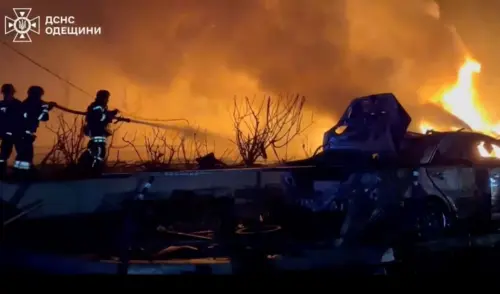Russian President Vladimir Putin agreed to temporarily halt attacks on Ukrainian energy facilities but did not commit to a full 30-day ceasefire that President Donald Trump hoped would pave the way for a permanent peace agreement.
Ukraine expressed support for the scaled-back proposal, which calls for both nations to refrain from targeting each other's energy infrastructure for about a month. Experts noted that Putin's reluctance to make substantial concessions may indicate a strategy to buy time as Russian forces advance in eastern Ukraine.
The White House announced that discussions would commence immediately regarding a maritime ceasefire in the Black Sea, alongside efforts for a more comprehensive ceasefire and a permanent peace deal, following a lengthy conversation between Trump and Putin.
It remains uncertain whether Ukraine would participate in these talks, which Trump envoy Steve Witkoff indicated would take place in Jeddah, Saudi Arabia.
"Until recently, we lacked consensus on these two aspects—the energy infrastructure ceasefire and the Black Sea firing moratorium. Today, we reached that consensus, and I believe we are a relatively short distance from achieving a full ceasefire," Witkoff stated during an appearance on Fox News.
The Kremlin did not immediately respond to requests for comment on Witkoff's remarks.
Putin ordered the Russian military to cease attacks on energy sites after his conversation with Trump. However, he expressed concerns that a temporary ceasefire could allow Ukraine to rearm and mobilize additional troops, insisting that any resolution must include an end to all military and intelligence assistance to Ukraine.
Trump noted on Fox News that aid to Ukraine was not discussed during their call.
Ukrainian President Volodymyr Zelenskiy confirmed Ukraine's acceptance of the proposal to halt strikes on energy facilities and infrastructure for 30 days. He reported that Russia launched over 40 drones late on Tuesday, impacting a hospital in Sumy and several areas, including the region surrounding Kyiv.
"Today, Putin effectively rejected the proposal for a complete ceasefire. It is right for the world to reject any attempts by Putin to prolong the war," Zelenskiy wrote on Telegram.
Trump, who has had a complex relationship with Zelenskiy, expressed satisfaction with his call to Putin. He stated, "We had a great call. It lasted almost two hours."
However, Trump did not achieve his objective of a full 30-day ceasefire, as Ukraine had agreed to the proposal, while Putin had not.
"This call highlighted the challenges of negotiating with Russia and their general resistance to making real progress in ending this war," said Kristine Berzina, a managing director at the German Marshall Fund. She described the limited ceasefire as "a very small step forward."
Since Russia's invasion, Ukraine has fought back against its larger neighbor with drone and missile strikes deep into Russian territory, including energy facilities. These attacks, which Moscow has labeled terrorism, have helped Kyiv maintain pressure on Russia's economy.
A ceasefire on attacking energy infrastructure could potentially benefit Russia, according to Maria Snegovaya, a senior fellow at the Center for Strategic and International Studies.
After the call, Trump announced that he and Putin agreed to work swiftly towards a ceasefire and ultimately a permanent peace agreement. He mentioned that they discussed various elements of a "Contract for Peace," highlighting the tragic loss of thousands of soldiers and the mutual desire of both leaders to see an end to the conflict.
Ukraine indicated on March 11 its willingness to accept a ceasefire, a step that U.S. officials believe would lead to more substantial negotiations to resolve Europe's largest conflict since World War II. The war has resulted in the deaths or injuries of hundreds of thousands and displaced millions, leaving entire towns in ruins.
Zelenskiy, who later arrived in Helsinki for an official visit, asserted that Europe must be included in any peace talks regarding Ukraine.
The discussions between Trump and Putin occurred alongside tensions in Gaza and challenges to securing lasting ceasefires in various long-standing conflicts.
The two leaders also addressed future conflict prevention in the Middle East, agreeing that Iran should never be in a position to threaten Israel.
As Russian forces advance in eastern Ukraine and from the Kursk region of Russia, the narrow ceasefire agreement reflects Trump's desire to improve relations with Russia. Analysts suggest that Putin may be seeking to buy time.
"It was striking how few concessions Trump is asking from the Russians, despite their invasion of Ukraine," remarked Susan Colbourn, a European security expert at Duke University's Sanford School of Public Policy.
U.S. allies have expressed concerns over Trump's overtures to Putin since his return to the White House in January.
Ukraine and its Western allies have long characterized Russia's invasion as an imperialist land grab, with Zelenskiy accusing Putin of intentionally prolonging the conflict. He maintains that Ukraine's sovereignty is non-negotiable and demands the return of all seized territory.
European Commission President Ursula von der Leyen highlighted on Tuesday that Russia had significantly ramped up its military production capabilities in anticipation of potential conflicts with European democracies.
During a press conference with French President Emmanuel Macron, Germany's outgoing Chancellor Olaf Scholz described the limited ceasefire as an important first step while reiterating the need for a complete ceasefire, emphasizing that Ukraine must be involved in final decisions.
Since seizing Crimea from Ukraine in 2014 and capturing much of four eastern Ukrainian regions in its 2022 invasion, Russia has come to control about one-fifth of Ukrainian territory.
Putin has claimed that his military intervention in Ukraine was driven by NATO's expansion posing a threat to Russia's security and demands that Ukraine abandon any aspirations to join the Western military alliance. He has also insisted that Russia retain control over the territories it has taken, that Western sanctions be lifted, and that Ukraine conduct a presidential election. Zelenskiy, elected in 2019, continues to serve under martial law imposed due to the ongoing war.
